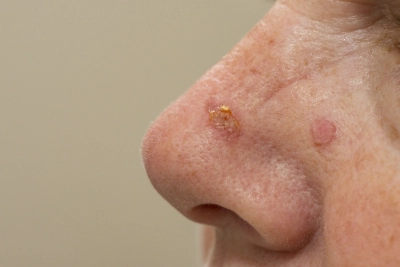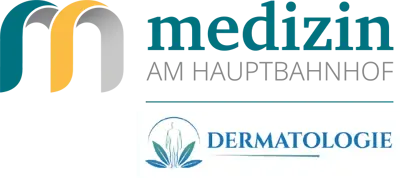
ACTINIC KERATOSIS AND DAYLIGHT PHOTODYNAMIC THERAPY (PDT)
PDT, ALSO CALLED DAYLIGHT PHOTODYNAMIC THERAPY, IS AN INNOVATIVE, PAINLESS METHOD FOR THE TREATMENT OF ACTINIC KERATOSIS AND FIELD CANCERIZATION IN PATIENTS WITH CHRONIC SUN DAMAGE. WHEN THE SPECIFIC DRUG IS INTRODUCED INTO THE DEEPER LAYERS OF THE SKIN WITH A LASER, IT GENERATES SKIN RENEWAL.
Photo: © clsdesign – stock.adobe.com
-
What are Actinic keratoses and why should they be treated?
-
What is PDT?
-
How does PDT work?
-
What type of skin alterations can be treated?
-
I already had PDT with a lamp and found it painful. Is Daylight PDT different?
-
Which season is best for undergoing this treatment?
-
What is the process like?
-
What can I expect after treatment?
-
Are there any alternative treatment options for Actinic keratosis?
-
How much does PDT treatment cost?
We are available for a personal consultation. Book your appointment here.
What are Actinic keratoses and why should they be treated?
Actinic keratosis is permanent damage to the skin. Typical signs are red-brown, rough and flaky spots in areas that are more frequently exposed to sunlight.
This includes the face, ears, bald head, forearms, neck and cleavage area, as well as the back of the hands. Even if the skin damage progresses slowly, it is considered a precursor to white skin cancer, (squamous cell carcinoma).
Actinic keratosis mainly affects people of middle and older age and especially those who have been exposed to sunlight and UV radiation for many years at work and in their private lives. Often the damage caused when young can become noticeable only years later.
Because skin damage develops into skin cancer in around every tenth person affected, everyone should seek medical treatment for Actinic keratosis. Only very occasionally do the keratoses recede on their own.
What is Daylight PDT?
Daylight Photodynamic Therapy (PDT) is a new, non-invasive treatment for white skin cancer. It uses special photosensitizers, i.e., substances that sensitize tumorous cells to light. Exposure to this visible light generates aggressive oxygen molecules and free radicals, that destroy the tumorous tissue while at the same time largely protecting the normal tissue.
We are available for a personal consultation. Book your appointment here.
How does Daylight PDT work?
After preparing the affected area, a light sensitizing substance is applied to the skin alterations or to the tumorous tissue. Compared to normal skin, this substance enriches the modified skin and/or the tumorous cells by a factor of ten.
What type of skin alterations can be treated?
This special type of light therapy is used to treat superficial tumors such as Actinic keratoses (precursors of white skin cancer), Bowen's disease or superficial basal cell carcinoma. PDT is approved for the treatment of Actinic keratoses and for pronounced sun damage to the skin.
I already had PDT with a lamp and found it painful. Is Daylight PDT different?
With conventional PDT (photodynamic therapy), the affected areas are exposed to a high-energy infrared or LED light for three hours after the ALA-containing cream has taken effect. The treatment is highly effective but can also be painful because the ALA cream reacts with the nerve endings. In addition, only small areas can be treated with this method.
In the case of Daylight PDT, the red component of sunlight is used, and exposure begins immediately after the ALA substance has been applied. As a result, the substance is utilized straight after it has penetrated the cells, even before the nerve endings can be reached and irritated.
Which season is best for undergoing this treatment?
The months from March to October. A temperature of over 10 °C is recommended, but we now know that the therapy is even more effective at over 20 °C. Sunny days (more than 200,000 LUX) are therefore recommended for the treatment, as the drug that is applied is activated by the sun.
What is the process like?
The process will be discussed with you in detail to clarify what will happen. The following protocol serves as a guide. There may be deviations in individual cases.
1. We ask that you apply a thick layer of sun protection cream with SPF 50+ to the areas that will be treated at least one hour before the appointment
2. Once at the practice, the areas are cleaned and then prepared with the laser (there may be slight discomfort)
3. The ALA cream is applied locally
4. After a maximum of 30 minutes incubation time you go outside and sit in the sun or partial shade
5. After two hours of exposure outside, we ask you to return home and remove all the cream residue with warm water. After this you may not go into the sun again
6. Please apply sun protection cream several times a day for the next few days
7. You must avoid the sun for the next 48 hours as the reaction could unintentionally continue.
Wear a hat outside!
8. Take good care of the treated areas with a healing ointment.
9. You will have a check-up after 4-6 weeks (further check-ups may be required)
We are there for you during the whole process. If any questions occur or you need assistance, we are there for you.
What can I expect after treatment?
After treatment, the skin will noticeably flake and peel in the days that follow. Sometimes there may be discomfort in the affected areas, if necessary, it is advisable to take pain relief. The new skin layer should be well protected with a healing ointment. One Daylight PDT treatment is sufficient in most cases, but several sessions may be necessary if the areas to treat are pronounced.
We are available for a personal consultation. Book your appointment here.
Are there any alternative treatment options for Actinic keratosis?
Yes, there are other treatment options available such as laser treatments and certain medications. We are happy to create an individual treatment plan for you.
How much does PDT treatment cost?
The treatment is currently not covered by statutory health insurance. We can happily provide you with an estimate of cost for your private health insurance at the practice in Vienna. The cost of treatment, including all material costs, is around 650 euros.
We are available for a personal consultation. Book your appointment here.
Further literature:
Actinic keratoses and the resulting squamous cell carcinoma are becoming a widespread problem in our aging population. In addition to good sun protection, there are other preventive and therapeutic measures that can be taken. Please read more in my article in the journal JATROS Dermatology & Plastic Surgery.


